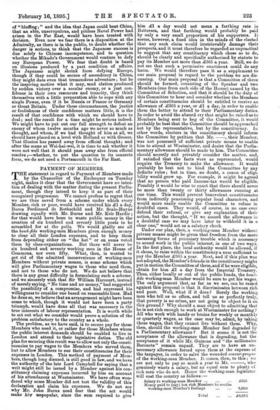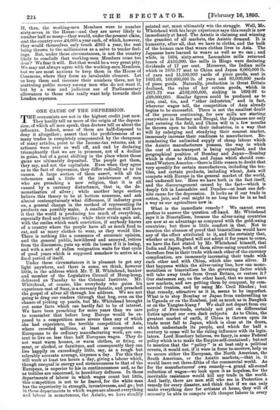PAYMENT OF MEMBERS. T HE statement in regard to Payment of
Members made by the Chancellor of the Exchequer on Tuesday night, makes it clear that the Government have no inten- tion of dealing with the matter during the present Parlia- ment, though they intend to keep it as part of their recognised programme. We cannot profess to regret that we are thus saved from a scheme under which every Member, rich or poor, would have received his £1 a day, Baron Ferdinand de Rothschild and Mr. Seale-Hayne drawing equally with Mr. Burns and Mr. Keir Hardie ; for that would have been to waste public money in the creation of six hundred and seventy little posts to be scrambled for at the polls. We would gladly see all the band-fide working-men Members given enough money to clear all their London expenses, and to keep them from depending either on "the hat" or on sums voted them by class-organisations. But there will never be six hundred and seventy working men in the House of Commons, nor even fifty. What, then, is wanted to get rid of the admitted inconvenience of working-men Members without private means, is some scheme which will give Parliamentary wages to those who need them, and not to those who do not. We do not believe that there is any great difficulty in formulating such a scheme, and we sincerely wish that Sir William Harcourt, instead of merely saying, "No time and no money," had suggested the possibility of a compromise, and had expressed his willingness to consider one based on reasonable lines. Had he done so, we believe that an arrangement might have been come to which, though it would not have been a party triumph, would have done all that was necessary in the true interests of labour representation. It is worth while to set out what we consider would prove a solution of the problem satisfactory to the country as a, whole. The problem, as we have said, is to secure pay for those Members who need it, or rather for those Members whom the public interest demands should be enabled to live in London and attend to their legislative duties. The old plan for securing this result was to allow not only the consti- tuencies to pay wages to the Members who served them, but to allow Members to sue their constituencies for their expenses in London. This method of payment of Mem- bers, though long disused, is still good in law, and we have the authority of the late Lord Campbell for saying that a writ might still be issued by a Member against his con- stituency claiming expenses incurred by him on account of his attendances at Westminster. We have often won- dered why some Member did not test the validity of this declaration and claim his expenses. We do not see why Mr. John Burns need fear that the act would make hire unpopular, since the sum required to give him £1 a day would not mean a farthing rate in Battersea, and that farthing would probably be paid by only a very small proportion of his supporters. It seems, however, a fixed idea in the minds of the elected that any such claim would irretrievably damage their prospects, and it must therefore be regarded as unpractical to suggest that any constituency which chose so to do, should be clearly and specifically authorised by statute to pay its Member not more than £365 a year. Still, we do not see that such a permissive enactment could do any harm. We would therefore pass it as a supplement to our main proposal in regard to the problem we are dis- cussing. Our main proposal is that a Committee of three should be formed, consisting of the Speaker and. two Members (one from each side of the House) named by the Committee of Selection, and that it should be the duty of this Committee to hear and consider whether the Members of certain constituencies should be entitled to receive an allowance of £365 a year, or £1 a day, in order to enable them the better to attend to their Parliamentary duties. In order to avoid the absurd cry that might be raised as to Members being sent to beg of the Committee, it would probably be best that the Committee should be approached not by the representative, but by the constituency. In other words, electors in the constituency should inform the Committee by petition that Mr. , their Member, was not possessed of sufficient private means to enable him to attend at Westminster, and desire that the Parlia- mentary allowance should be made to him. The Committee should secretly and privately consider the matter, and, if satisfied that the facts were as represented, would require the Treasury to make the allowance. It would probably be best not to bind the Committee by any definite rules ; but in time, no doubt, a canon of eligi- bility would grow up. For example, it might be agreed that no person who paid Income-tax would be eligible. Possibly it would be wise to enact that there should never be more than twenty or thirty allowances running at one time. This would prevent benevolent constituencies from indirectly pensioning popular local characters, and would more easily enable the Committee to refuse in doubtful cases. They would, of course, in no case ever defend their refusal, or give any explanation of their action, but the thought, "If we accord the allowance in a doubtful case we may have later to withhold it in a clear one," would act as a salutary check. Under our plan, then, a working-man Member without private means might be given that freedom from the more harassing forms of pecuniary trouble which is necessary to sound work in the public interest, in one of two ways. In the first place, the local authority would be allowed, if it chose, to raise within the constituency a sum sufficient to pay the Member £365 a year. Next, and if this plan was not adopted, the Member's friends in the constituency might put in motion the Committee of three, and if he were eligible, obtain for him -el a day from the Imperial Treasury. Thus, either locally or out of the public funds' the bona- fide working-man Member would be sure to get his wages. The only argument that, as far as we see, can be raised against this proposal is that it discriminates between rich and poor. Well, what if it does ? Surely the working men who tell us so often, and tell us so perfectly truly, that poverty is no crime are not going to object to it on this ground. ? Why should a man object to admitting that he is not rich enough to work at Westminster for nothing ? All who work with hands or brains for weekly or monthly or quarterly wages, as the case may be, admit, by taking those wages, that they cannot live without them. Why, then, should the working-man Member feel degraded by a Parliamentary allowance ? But it seems it is not the acceptance of the allowance that is degrading, but the acceptance of it while Mr. Guineas and "the millionaire Baronets" remain unpaid. They are to have an un- necessary allowance forced upon them at the expense of the taxpayer, in order to salve the wounded amour-propre of the working-man Member. It comes, then, to this ; we are not only to pay so much a year to Mr. who genuinely wants a salary, but an equal sum to plenty of rich men who do not. Hence the working-man legislator will cost the country as follows :—
Salary to working-man Member ... .065 Money paid to (say) ten rich Members to soothe working-man Member's feelings 3,650 Tot al '" ... £4,015
If, then, the working-men Members were to number sixty-seven in the House—and they are never likely to number half so many—they would, under the present claim, cost the country over £4,000 a year each, of which, however, they would themselves only touch £365 a year, the rest being thrown to the millionaires as a salve to tender feel- ings. But, under these circumstances, is not the country likely to conclude that working-men Members come too dear? We fear it will. But that would be a very great pity. We may not always agree with the working-men Members, hut we are most anxious to keep them in the House of Commons, where they form an invaluable element. Let us keep them and increase their numbers there, not by scattering public money among men who do not want it, but by a wise and judicious use of Parliamentary allowances to those who really want help towards their London expenses.



































 Previous page
Previous page